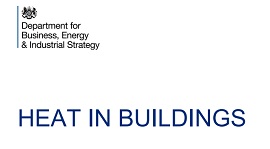The future of heat
In January 2017, BSRIA lent its support to a government consultation seeking input from the construction industry to help develop and support future policies for heat in non-domestic buildings.
The Department for Business, Energy and Industrial Strategy (BEIS) suggests non-domestic buildings in the UK account for 12% of greenhouse gas emissions. Meeting the UK’s 2050 carbon reduction target will require eliminating nearly all emissions from heating buildings and a substantial proportion from heating for industrial processes.
The consultation is open until: Friday 27th January 2017 and can be seen here.
The consultation considers:
- Keeping energy bills as low as possible.
- Continuing to ensure the nation has a secure and resilient system.
- Remaining at the leading edge of science, research and innovation.
- Reducing carbon emissions cost-effectively.
Alongside this call for evidence, BEIS is publishing the Building Energy Efficiency Survey (BEES) (building energy efficiency survey) research.
BEES provides detail on energy use and abatement potential to reduce energy and carbon emissions, as well as barriers and enablers across the whole non-domestic building stock.
Peter Tse, BSRIA Principal Design Consultant, said:
“We urge BSRIA members and industry alike to complete this survey. This consultation provides the opportunity for the building industry to provide the context to support development of a long term policy strategy to deliver the most effective savings.”
Early in 2016, BSRIA was commissioned by the former Department of Energy & Climate Change (DECC) to provide them with a better understanding of current knowledge and gaps in knowledge in relation to low-carbon heating and cooling systems in the non-domestic sector.
This work identified industry experiences, drivers and challenges associated with low-carbon technologies, the industry view on current relevant policies and standards and recommendations to support the policy making process.
It was supplemented by a jointly-hosted event by BSRIA and BEIS to discuss the standards and performance of heating systems in non-domestic buildings and what roles government and industry should take to overcome the challenges to the uptake of low-carbon technologies and measures.
This article was originally published here by BSRIA in Jan 2017.
--BSRIA
[edit] Related articles on Designing Buildings
- BSRIA articles on Designing Buildings Wiki.
- Global challenges and opportunities in heating markets in 2020.
- Heat meter.
- Heat metering.
- Heat pumps and heat waves: How overheating complicates ending gas in the UK.
- Heat transfer.
- Latent heat.
- Sensible heat.
- Specific heat capacity.
- The future of the HVAC and building controls industry.
- Thermal comfort.
- Thermostat.
Featured articles and news
A change to adoptive architecture
Effects of global weather warming on architectural detailing, material choice and human interaction.
How big is the problem and what can we do to mitigate the effects?
Overheating guidance and tools for building designers
A number of cool guides to help with the heat.
The UK's Modern Industrial Strategy: A 10 year plan
Previous consultation criticism, current key elements and general support with some persisting reservations.
Building Safety Regulator reforms
New roles, new staff and a new fast track service pave the way for a single construction regulator.
Architectural Technologist CPDs and Communications
CIAT CPD… and how you can do it!
Cooling centres and cool spaces
Managing extreme heat in cities by directing the public to places for heat stress relief and water sources.
Winter gardens: A brief history and warm variations
Extending the season with glass in different forms and terms.
Restoring Great Yarmouth's Winter Gardens
Transforming one of the least sustainable constructions imaginable.
Construction Skills Mission Board launch sector drive
Newly formed government and industry collaboration set strategy for recruiting an additional 100,000 construction workers a year.
New Architects Code comes into effect in September 2025
ARB Architects Code of Conduct and Practice available with ongoing consultation regarding guidance.
Welsh Skills Body (Medr) launches ambitious plan
The new skills body brings together funding and regulation of tertiary education and research for the devolved nation.
Paul Gandy FCIOB announced as next CIOB President
Former Tilbury Douglas CEO takes helm.
UK Infrastructure: A 10 Year Strategy. In brief with reactions
With the National Infrastructure and Service Transformation Authority (NISTA).
Ebenezer Howard: inventor of the garden city. Book review.
Airtightness Topic Guide BSRIA TG 27/2025
Explaining the basics of airtightness, what it is, why it's important, when it's required and how it's carried out.























